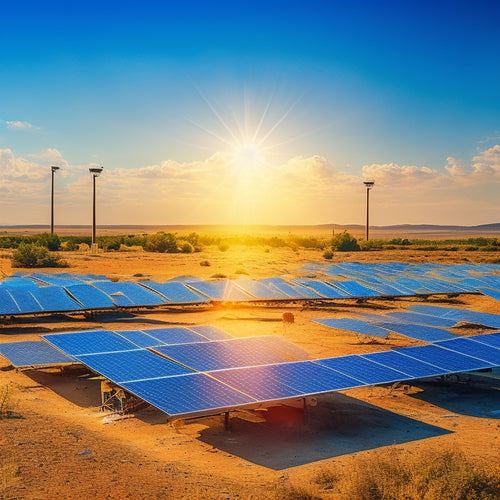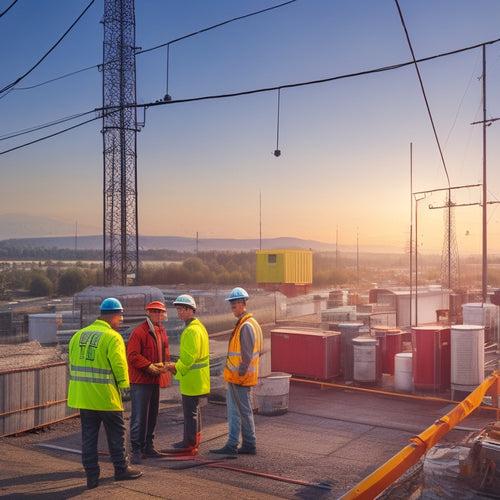
Top Home Energy Storage Battery Systems
Share
You're looking for the top home energy storage battery systems, and you've come to the right place. SimpliPhi Power, Rolls-Surrette, and East Penn Deka are top brands worth evaluating. When selecting a system, prioritize high energy density, cycle life, and maintenance requirements. Efficient systems with long cycle life expectancy, like Rolls-Surrette S-550, can provide increased grid resilience and improved battery durability. As you explore your options, keep in mind that the best system for you will depend on your specific energy needs and goals. Now, explore further to discover the perfect fit for your home.
Key Takeaways
• SimpliPhi Power, Rolls-Surrette, and East Penn Deka are top off-grid battery brands with high energy density and long cycle life.
• Lithium-ion batteries are popular due to high energy density, while lead-acid batteries are inexpensive but less efficient.
• Capacity, voltage, and depth of discharge are crucial considerations when selecting a deep cycle battery for home energy storage.
• Long cycle life expectancy is critical, with Rolls-Surrette S-550 and Crown Battery CR-430 offering impressive lifespans and reduced maintenance costs.
• High round-trip efficiency and long cycle life are key characteristics of the most efficient energy storage systems, enabling more storage in a smaller footprint.
Top Off Grid Battery Brands
When venturing off the grid, selecting the right battery brand is essential, and you'll want to factor in the top off grid battery brands that have proven their reliability and performance in the field.
You'll want to contemplate brands that have received positive brand reviews from customers and industry experts alike. In the current market trends, lithium-ion batteries are gaining popularity due to their high energy density and long lifespan.
Some top off grid battery brands to ponder include SimpliPhi Power, Rolls-Surrette, and East Penn Deka. These brands have established themselves as leaders in the industry, offering high-quality products that meet the unique demands of off-grid energy systems.
When researching these brands, look for reviews from reputable sources, such as industry publications and customer testimonials, to get a sense of their performance and reliability. By doing your due diligence, you can make an informed decision and choose the best battery brand for your off-grid energy needs.
Best Deep Cycle Battery Options
When selecting the best deep cycle battery for your home energy storage system, you'll want to contemplate the type of battery that best suits your needs.
You'll need to weigh the pros and cons of different battery types, such as flooded, AGM, or lithium-ion, based on factors like cost, maintenance requirements, and performance.
Battery Type Comparison
Understanding the merits of each battery chemistry is crucial for evaluating several key factors, including depth of discharge, cycle life, and maintenance requirements, in order to determine which deep cycle battery type best suits your home energy storage needs. With so many options available, grasping the advantages of each battery chemistry is vital.
Here are some key considerations for different battery types:
-
Lithium-ion (Li-ion) batteries: Offer high energy density, long cycle life, and low maintenance. Lithium merits include high discharge rates, making them ideal for applications requiring rapid charging and discharging.
-
Lead-acid batteries: Inexpensive and widely available, but heavier and less efficient than Li-ion batteries.
-
Nickel-cadmium (Ni-Cd) batteries: Toxic materials and limited recyclability make them less popular.
-
Nickel-metal hydride (NiMH) batteries: Environmentally friendly, but less energy-dense than Li-ion batteries.
-
Sodium-ion batteries: A promising alternative to Li-ion, with similar performance at a lower cost.
When choosing a battery type, take into account your specific energy storage needs, budget, and environmental concerns. By evaluating these factors, you'll be able to select the best deep cycle battery for your home energy storage system.
Deep Cycle Battery Features
With your battery type selected, it's time to explore the key features that make a deep cycle battery suitable for your home energy storage system. You'll want to assess the battery's capacity, voltage, and depth of discharge (DOD) to guarantee it meets your energy needs. A higher DOD means more usable energy, but may impact the battery's lifespan.
When evaluating deep cycle batteries, look for a high cycle life rating, as it indicates the battery's ability to endure repeated charge and discharge cycles. Conduct a cycle life analysis to determine the battery's overall performance and lifespan.
Additionally, take into account the battery's maintenance requirements, as some deep cycle batteries require periodic watering or equalization charging. Follow battery maintenance tips to prolong the battery's lifespan and optimize its performance.
Other important features to take into account include the battery's temperature range, charging speed, and compatibility with your inverter or charge controller. By carefully assessing these features, you'll be able to select the best deep cycle battery for your home energy storage system, ensuring reliable and efficient energy storage.
Long Cycle Life Expectancy
A deep cycle battery's cycle life expectancy, measured in the number of charge and discharge cycles it can handle, is a critical factor in determining its overall value. Top-rated options like the Rolls-Surrette S-550 and the Crown Battery CR-430 consistently deliver long cycle life expectancies. You want a battery that can withstand the demands of daily charging and discharging without compromising its performance.
A longer cycle life means you'll enjoy a longer battery lifespan, reduced maintenance costs, and enhanced grid resilience.
Here are some key benefits of a long cycle life expectancy:
-
Increased Grid Resilience: With a battery that can handle more charge and discharge cycles, you can rely on a steady flow of energy even during grid outages.
-
Improved Battery Durability: A longer cycle life means your battery will last longer, reducing the need for frequent replacements and minimizing electronic waste.
-
Reduced Maintenance Costs: With fewer replacements needed, you'll save on maintenance costs and enjoy a lower total cost of ownership.
-
Enhanced Energy Independence: A reliable battery with a long cycle life enables you to store excess energy generated by your solar panels or wind turbines, giving you more control over your energy usage.
-
Better Return on Investment: A longer-lasting battery means you'll get a better return on your investment, making your renewable energy system more cost-effective in the long run.
Most Efficient Energy Storage Systems
The most efficient energy storage systems, typically characterized by high round-trip efficiency and long cycle life, have become an essential component of modern home energy storage battery systems. As you consider investing in a home energy storage system, it's important to prioritize efficiency to maximize your return on investment.
Look for systems with high energy density, which enables more energy to be stored in a smaller footprint. This not only saves space but also reduces installation costs. Moreover, efficient energy storage systems are critical for grid resilience, allowing you to store excess energy generated during the day for use during peak hours or during power outages.
Longest Lasting Home Battery Solutions
Opting for a home battery solution that lasts maximizes your investment, as it guarantees you can store and use renewable energy efficiently over an extended period. A long-lasting battery solution ensures energy resilience, providing you with a reliable backup power source during outages or natural disasters.
To achieve this, consider the following factors:
-
Depth of discharge: Look for batteries with a high depth of discharge, allowing you to use more of the battery's capacity without reducing its lifespan.
-
Cycle life: Choose batteries with a high cycle life, which measures the number of charge and discharge cycles a battery can handle before its capacity degrades.
-
Battery maintenance: Regular maintenance, such as monitoring temperature and state of charge, helps extend the battery's lifespan.
-
Chemistry: Select batteries with a durable chemistry, like lithium-iron phosphate, which is known for its long lifespan and low maintenance requirements.
-
Warranty and support: Consider manufacturers that offer thorough warranties and dedicated customer support for maintenance and repairs.
Affordable Off Grid Energy Systems
You can greatly reduce your energy bills and carbon footprint by investing in affordable off-grid energy systems that harness renewable energy sources like solar or wind power. These systems have become increasingly cost-competitive with traditional grid electricity, achieving grid parity in many regions. This development has opened up new opportunities for rural electrification, where off-grid energy systems can provide reliable and sustainable power to remote communities.
With the cost of renewable energy decreasing, it's now possible to power your home or business entirely off the grid, reducing your reliance on fossil fuels and lowering your environmental impact.
When choosing an off-grid energy system, consider factors like energy storage, system design, and installation costs. Look for systems that integrate seamlessly with your energy needs, providing a reliable and efficient supply of power.
High Capacity Battery Storage Solutions
When exploring high capacity battery storage solutions, you'll likely need to evaluate large scale energy needs, whether it's for a commercial property or a residential complex with heavy energy demands.
You'll want to explore deep cycle battery options that can handle frequent charging and discharging without sacrificing performance.
Large Scale Energy Needs
Large-scale energy storage demands, typically exceeding 100 kilowatt-hours, require high-capacity battery solutions that can efficiently meet the intense power needs of commercial and industrial applications. As you explore high-capacity energy storage solutions, you'll find that these systems are designed to support industrial power requirements, guaranteeing uninterrupted operations and reducing downtime.
Some key benefits of large-scale energy storage solutions include:
-
Scalable design: Modular systems that can be easily expanded or contracted to meet changing energy demands.
-
High-capacity energy storage: Exceeding 100 kilowatt-hours to support industrial power requirements.
-
Efficient charging and discharging: Optimized for rapid charging and discharging to minimize downtime and maximize productivity.
-
Advanced monitoring and control: Real-time monitoring and control systems to ensure peak performance and energy efficiency.
-
Customizable solutions: Tailored to meet the specific energy demands of your commercial or industrial application.
Deep Cycle Battery Options
For high-capacity energy storage solutions, deep cycle battery options offer reliable, long-duration power backup, ensuring your commercial or industrial operation remains productive during extended outages or peak demand periods. These batteries are designed to provide a steady flow of energy over an extended period, making them ideal for applications that require a consistent power supply.
When selecting a deep cycle battery, it's important to take into account factors such as battery maintenance and cycle testing to guarantee peak performance.
Regular battery maintenance is vital to extend the lifespan of your deep cycle battery. This includes monitoring temperature, voltage, and charging/discharging rates to prevent overheating, overcharging, or undercharging. Cycle testing is also crucial to determine the battery's capacity and overall health. This involves simulating real-world usage scenarios to assess the battery's performance and identify potential issues.
Long Lasting Energy Storage
By opting for high-capacity battery storage solutions, you can secure a reliable and consistent flow of energy over extended periods, effectively mitigating the impact of power outages or peak demand fluctuations. This is especially important for homeowners seeking energy resilience and grid independence. With long-lasting energy storage, you can guarantee that your essential appliances and devices remain operational even when the grid is down.
Here are some benefits of high-capacity battery storage solutions:
-
Increased energy independence: Store excess energy generated by your solar panels or wind turbines and use it when you need it most.
-
Extended backup power: Keep your critical systems running for days, not just hours, during power outages.
-
Reduced peak demand charges: Shift your energy usage to off-peak hours and reduce your reliance on the grid.
-
Improved energy efficiency: Optimize your energy usage and reduce waste with advanced battery management systems.
-
Enhanced energy resilience: Weather any storm or grid outage with confidence, knowing you have a reliable source of backup power.
Most Popular Home Energy Storage Systems
You can choose from several popular home energy storage systems, each offering unique features and benefits that cater to different energy needs and budgets. When selecting a system, consider factors like capacity, depth of discharge, and compatibility with your existing solar panel setup.
The Tesla Powerwall is a popular choice, known for its sleek design and seamless integration with solar panels. The LG Chem RESU, on the other hand, offers a high energy density and is compatible with various inverter brands. If you're looking for a more affordable option, the SimpliPhi Power battery is a great alternative.
Many of these systems can be integrated with home automation systems, allowing you to monitor and control your energy usage remotely. Additionally, many governments offer energy incentives, such as tax credits or rebates, for homeowners who invest in energy storage systems. Be sure to research the incentives available in your area to maximize your savings.
Advanced Off Grid Battery Technologies
As you explore energy storage solutions, advanced off-grid battery technologies can provide enhanced performance, reliability, and flexibility for your renewable energy system. These cutting-edge technologies are designed to optimize energy storage and management, enabling you to maximize your renewable energy output and reduce your reliance on the grid.
Some key benefits of advanced off-grid battery technologies include:
-
Improved Grid Resiliency: Advanced battery systems can provide backup power during outages, ensuring you stay connected and productive.
-
Enhanced Renewable Integration: These technologies enable seamless integration with renewable energy sources, such as solar and wind power, to maximize energy harvesting.
-
Advanced Monitoring and Control: Real-time monitoring and control systems enable you to optimize energy storage and usage, reducing waste and improving efficiency.
-
Increased Energy Autonomy: With advanced off-grid battery technologies, you can enjoy greater energy independence and reduced reliance on the grid.
-
Scalability and Flexibility: These systems can be scaled up or down to meet your specific energy needs, providing a flexible and adaptable energy storage solution.
Frequently Asked Questions
Can I Use a Single Battery for Both On-Grid and Off-Grid Systems?
Crafting a clever combination, you can configure a single battery for both on-grid and off-grid systems, ensuring battery compatibility and system flexibility, but it's essential to take into account specific requirements and restrictions for seamless integration.
How Often Should I Maintain My Home Energy Storage System?
You should regularly inspect your battery's state of charge, voltage, and temperature to guarantee peak Battery Health and System Efficiency, performing routine maintenance every 3-6 months to prevent degradation and maximize performance.
Are Energy Storage Batteries Affected by Extreme Temperatures?
'Can you handle the heat? When temperatures soar or plummet, your energy storage batteries' performance takes a hit. Thermal capacity decreases, and climate durability is put to the test - it's important to choose batteries designed to thrive in extreme conditions.'
Can I Use Any Inverter With My Energy Storage Battery System?
You'll need to guarantee inverter compatibility with your energy storage battery system, considering factors like battery configuration, voltage, and communication protocols to ensure smooth integration and peak performance.
Do Energy Storage Systems Work With Solar Panels Only?
You can integrate energy storage systems with solar panels, but they don't solely rely on them; they can also work with grid ties, providing power backup during outages, and optimizing your energy usage.
Related Posts
-

Is This the Future of Alternative Energy Systems
Yes, alternative energy systems are shaping the future of energy. Innovations in solar and wind technologies are driv...
-

What Happens Without a Charge Controller in Solar Panels
Without a charge controller in your solar panel system, you risk overheating batteries due to overcharging, which can...
-

Smart Grid Technology Implementation Challenges
You'll encounter several challenges when implementing smart grid technology, particularly in cost management, scalabi...


